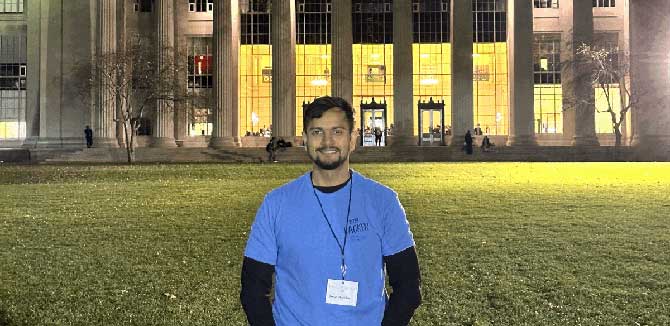Seeing MEM in a More Holistic Way
Rahul Vashisht (MEM '25) explains how he created a memorable and meaningful experience at the MIT Energy and Climate Hackathon thanks to lessons learned in the MEM program.

The Massachusetts Institute of Technology (MIT) welcomed 60 teams of students to its campus in November for the school's 10th annual energy and climate hackathon.
One of those students was Rahul Vashisht (MEM '25).
Vashisht was drawn to the event so he could tackle real-world challenges in a competitive, game-like setting. To do so, he relied on seven years of experience as a mechanical engineer in the oil industry and lessons learned in the classroom of Northwestern's Master of Engineering Management (MEM) program.
"Hackathons provide an excellent platform to test and enhance teamwork, brainstorming, problem-solving, presentation, management, competitive, and collaborative skills," he said. "Beyond skill-building, hackathons bring together passionate individuals, making them a great opportunity to network and connect with like-minded peers."
Vashisht partnered with three students from Harvard and one from MIT at the event, where they were asked to develop a tool to assess the value of incorporating a battery storage system to a company's renewable energy generation facilities. The challenge was posed by Avangrid, an energy company that operates a number of solar and wind energy plants.
Avangrid discovered that during periods of low demand, it often had a surplus of renewable energy available for generation. The company shared hourly energy transaction data from five of its plants for Vashisht and his teammates to analyze.
The team developed a linear optimization tool that accounted for various factors, including:
- Battery capacity size
- Battery charging and discharging strategies
- Cost of installing suitable battery storage
- Hourly energy pricing
- Optimal energy arbitrage and trading opportunities
- Tax credit policies
- Vashisht and his teammates shared their solution as part of a required seven-minute presentation. It was then that the team shared its tool and explained how it predicted that one of Avangrid's plants could save at least $200,000 per year by introducing the battery storage system.
Vashist said his team identified each member's strengths and skills to help effectively address the challenge. His primary contribution was formulating the problem as a mathematical model.
"The judges appreciated the depth of analysis we brought to the problem," he said.
They also commended our tool's capability to identify potential trading strategies aimed at maximizing revenue while minimizing carbon footprint. After our presentation, the judges specifically praised our approach to explaining the tool's modular design philosophy, which allows it to be applied to solar, wind, or a combination of both energy sources."
Vashisht also participated in a mini-challenge at the Hackathon that required him to create a seven-second video conveying a message related to energy or climate. Vashisht's brief explanation of how end-of-life batteries could be repurposed to store renewable energy earned him third-place honors.
During both the mini-challenge and the hackathon, Vashisht found himself applying lessons he learned from a variety of MEM courses. Product Management taught him how to explore problems and solutions more effectively, Decision Tools for Managers showed him how to apply linear programming and optimization techniques, and NUvention gave him a strong foundation to understand problems in depth.
He also credited Engineering Management for helping him develop the financial, accounting, and presentation skills needed to assess and present his team's solution.
"The experience I gained allowed me to view each lesson from my MEM program as part of a unified objective," he said. "I now see these courses not as isolated subjects but as interconnected steps in solving a larger problem, reinforcing the idea of problem-solving as an engineering manager. This shift in perspective will help me approach my education — and ultimately my career — in a more holistic and strategic manner."

